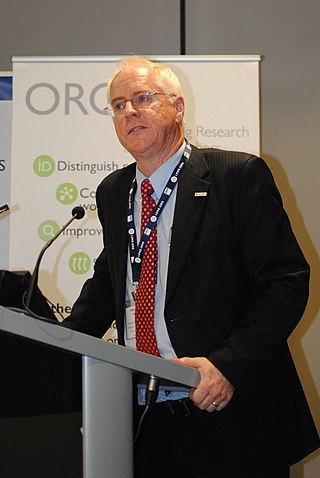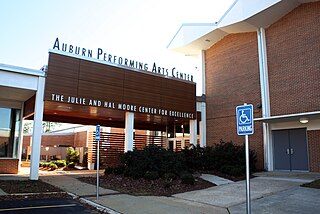
La Trobe University is a public research university based in Melbourne, Victoria, Australia. Its main campus is located in the suburb of Bundoora. The university was established in 1964, becoming the third university in the state of Victoria and the twelfth university in Australia. La Trobe is one of the Australian verdant universities and also part of the Innovative Research Universities group.

The University of the Sunshine Coast (UniSC) is a public university based on the Sunshine Coast, Queensland, Australia. After opening with 524 students in 1996 as the Sunshine Coast University College, it was later renamed the University of the Sunshine Coast in 1999.
The Australian Research Council (ARC) is the primary non-medical research funding agency of the Australian Government, distributing more than A$800 million in grants each year. The Council was established by the Australian Research Council Act 2001, and provides competitive research funding to academics and researchers at Australian universities. Most health and medical research in Australia is funded by the more specialised National Health and Medical Research Council (NHMRC), which operates under a separate budget.
The Faculty of Science at the University of Melbourne is one of the largest in Australia, with over 10,000 undergraduate and postgraduate students and a significant interdisciplinary research agenda.

Keith Alexander Nugent FAA is an Australian physicist. He is the Deputy Vice-Chancellor of the Australian National University (ANU) in Canberra.
Excellence in Research for Australia (ERA) is Australia’s national research evaluation framework, developed and administered by the Australian Research Council (ARC). The first full round of ERA occurred in 2010, and subsequent rounds followed in 2012, 2015 and 2018. A round was scheduled for 2023, but in September 2022 the ARC announced that this would be postponed as they were transitioning the ERA process to a more robust and data driven model.
RMIT's School of Media and Communication is an Australian tertiary education school within the College of Design and Social Context at the Royal Melbourne Institute of Technology, located in Melbourne, Victoria.
The School of Chemistry, University of Sydney is a school of the Faculty of Science at the University of Sydney.
The ARC Centre of Excellence for Creative Industries and Innovation (CCI) was an Australian research centre that undertook research in media studies, cultural studies, communication studies, law, education, economics, business technology, and information technology, related to the creative economy, between 2005 and 2013.
AusStage: The Australian Live Performance Database is an online database which records information about live performances in Australia, providing records of productions from the first recorded performance in Australia up until the present day. The only repository of Australian performing arts in the world, it is managed by a consortium of universities, government agencies, industry organisations and arts institutions, and mostly funded by the Australian Research Council. Created in 2000, the database contained more than 250,000 records by 2018.

A center of excellence, also called excellence center, is a team, a shared facility or an entity that provides leadership, best practices, research, support or training for a focus area.
Michelle Louise Coote FRSC FAA is an Australian polymer chemist. She has published extensively in the fields of polymer chemistry, radical chemistry and computational quantum chemistry. She is an Australian Research Council (ARC) Future Fellow, Fellow of the Royal Society of Chemistry (FRSC) and Fellow of the Australian Academy of Science (FAA).
Mark A. F. Kendall is an Australian biomedical engineer, inventor, scientist and entrepreneur.
The Australian Laureate Fellowship is an Australian professorial research fellowship awarded by the Australian Research Council. Fellows are chosen each year for five-year awards. In 2023 8 industry-focused Laureate Fellowships were awarded for the first time.
The ARC Centre of Excellence for the History of Emotions (CHE) is an Australian research centre that undertakes research in the history of emotions. The Centre was established in 2011 with core funding from the Australian Research Council (ARC), the Australian Government's main agency for allocating research funding to academics and researchers in Australian universities. The Centre of Excellence for the History of Emotions uses historical knowledge from medieval and early modern Europe to understand how societies have understood, experienced, expressed and performed emotions in pre-modern Europe, and how this long history impacts on contemporary Australia.
The ARCCentre of Excellence in Population Ageing Research (CEPAR) is a collaboration of leading researchers in population ageing. CEPAR is an Australian Research Council Centre of Excellence. It was established in 2011. It is based at the University of New South Wales, with further nodes at the Australian National University, Curtin University, University of Melbourne and University of Sydney. CEPAR was the first social science centre to receive Centre of Excellence funding.
The ARC Centre of Excellence for Automated Decision-Making and Society (ADM+S) is a multi-institutional, multi-disciplinary research centre based at RMIT University in Melbourne, Australia. The Centre aims to contribute to the knowledge and strategies necessary for responsible, ethical and inclusive automated decision-making (ADM). It was established in 2020 with funding from the Australian Government through the Australian Research Council (ARC) and other partners. The Centre examines the social and technical aspects of ADM, seeing automated systems as the outcomes of interactions between people, machines, data and institutions. It has a particular focus on the domains of news and media, transport and mobility, social services and health.
The ARC Centre of Excellence for Australian Biodiversity and Heritage (CABAH) is a research centre which focuses on the natural, historic and Indigenous heritage of Australia. Its aim is to increase understanding of the past in order to be able to better adapt and plan for the future.
Nicki Packer FRSC is a distinguished professor of glycoproteomics in the School of Natural Sciences at Macquarie University and principal research leader at Griffith University's Institute for Glycomics. Packer is a Fellow of the Royal Society of Chemistry and in 2021 received the Distinguished Achievement in Proteomic Sciences Award from the Human Proteome Organization. Her research focuses on biological functional of glycoconjugates by linking glycomics with proteomics and bioinformatics.
The Australian Research Council (ARC) Centre of Excellence in Synthetic Biology (CoESB) is a research centre that combines molecular biology, biotechnology, engineering, philosophy and ethics to design and build microbes that produce valuable products from agricultural and municipal waste. The Centre aims to use these microbes to seed a bio-based circular economy and leverage Australia's strengths in agriculture.


